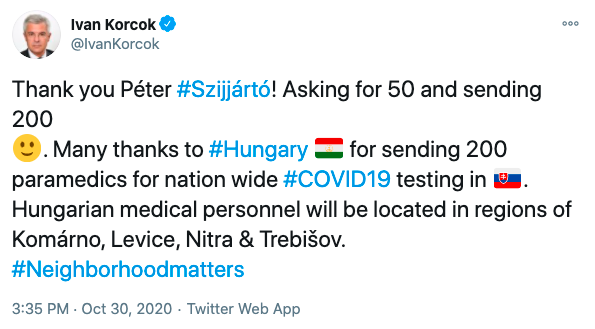Hungary helps: the government sends hundreds of paramedics to Slovakia

The Slovak government is testing every citizen during the weekend, and Hungary is helping that project by sending 200 healthcare professionals to its Northern neighbour where approximately 0.5 million Hungarians live even today.
According to 444, Ivan Korčok, the minister responsible for foreign and EU affairs, said on Twitter that his government asked for only 50 people. However, Hungary sends 200, for which he is very thankful to foreign minister Péter Szijjártó. He also added that they would send the Hungarian paramedics to Komárno (Komárom), Levice (Léva), Nitra (Nyitra), and Trebišov. The former three are in the SW regions of the country while the latter one is in Eastern Slovakia.

Two weeks ago, because of the rising number of COVID-19 infections, the government decided to start an unprecedented testing program. In practice, there has been a curfew in Slovakia since last weekend, and the authorities will do the testing during the next two weekends. Based on the report, they will use devices detecting the antigens of the virus.
- Even Fidesz MPs want PM Viktor Orbán to introduce stricter anti-COVID-19 measures
- Hungary precedes Slovakia in GDP per capita for the first time in 10 years
- Foreign minister: Ethnic Hungarians in Slovakia can rely on Hungary’s continued support
According to 444, the Hungarian government recruits volunteers in many healthcare institutions and medical universities to Slovakia. In some cases, they offered a good salary for taking part in the project. The media outlet wanted to get more information about the project on Friday but received no answer. They also added that
the Hungarian healthcare system struggles a lot with the lack of professionals
while the number of patients is growing unstoppably.
We reported before that a Hungarian doctor penned a long letter about the difficult circumstances they have to work under in the healthcare system. She wrote that what a coronavirus-infected patient needs is to be “accompanied by appropriate intensive care unit staff 24 hours a day: an anesthesiologist, an intensive care physician, and an intensive care specialist nurse. And even then, the chances of recovery are modest.”
According to Dr Máté-Horváth,
the biggest problem throughout this pandemic has been the low number of intensive care nurses.
“We are talking about a very special area of being a nurse, one that they have learned for years and practised for a long time after their studies. They can care for a ventilated patient, set up a ventilator at a basic level, replace vital drug pumps with lightning speed, catheterise, puncture an artery, operate a central venous cannula, place a heart monitor, and wind complicated cables in the correct order to the patient. They see if a patient is deteriorating, they see if there is trouble, and they jump and act. They are a very special team.
Because of the shortage of trained professionals, a team of two thousand specialists must provide care for intensive care patients 24 hours a day (2-3 shifts), 7 days a week.
An intensive care nurse can only take care of two ventilated, unstable patients at a time, according to the rules of the profession. Although this number may seem low, it is “an important quality indicator” of the care the ICU provides.
Source: 444.hu







